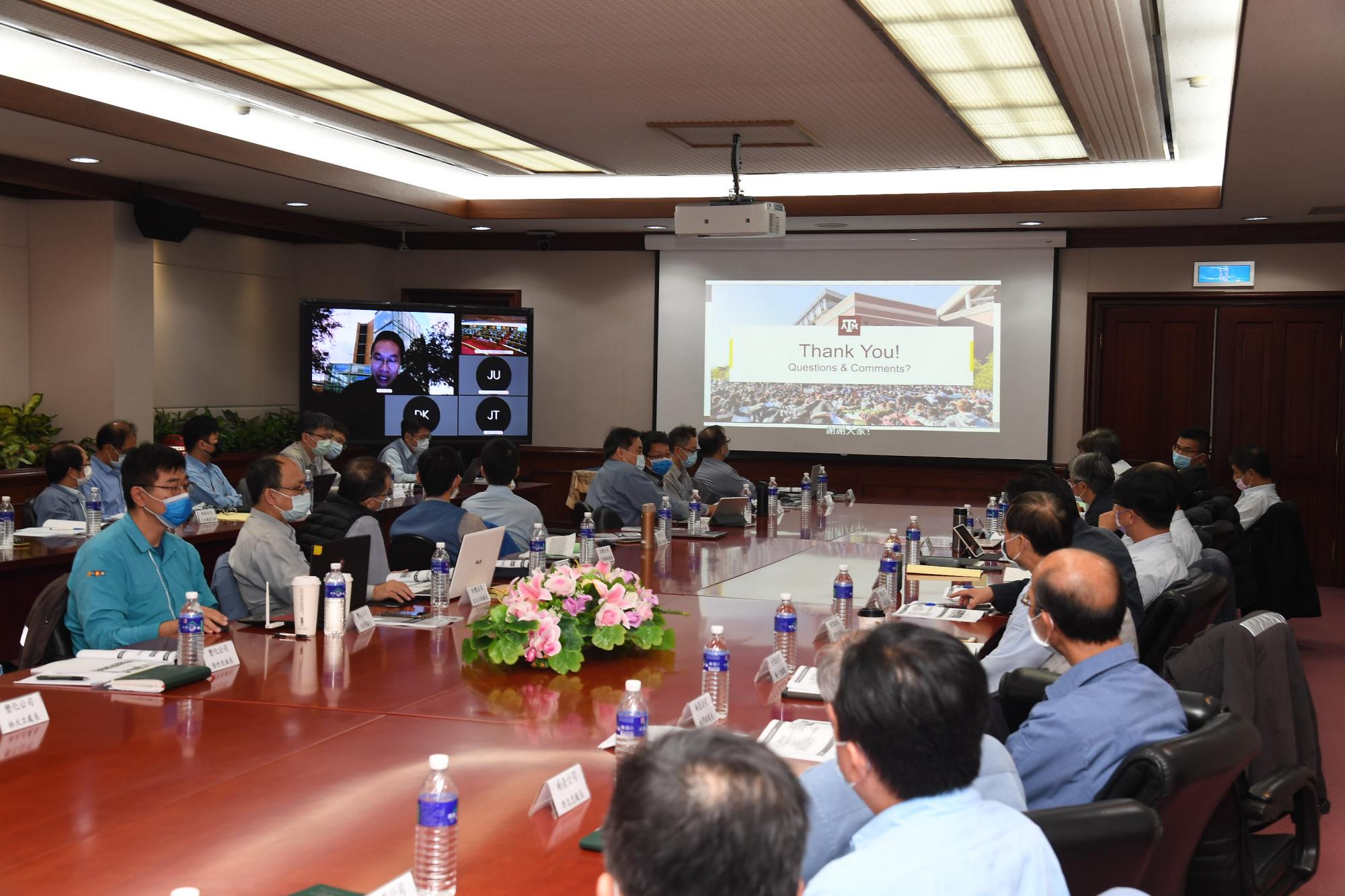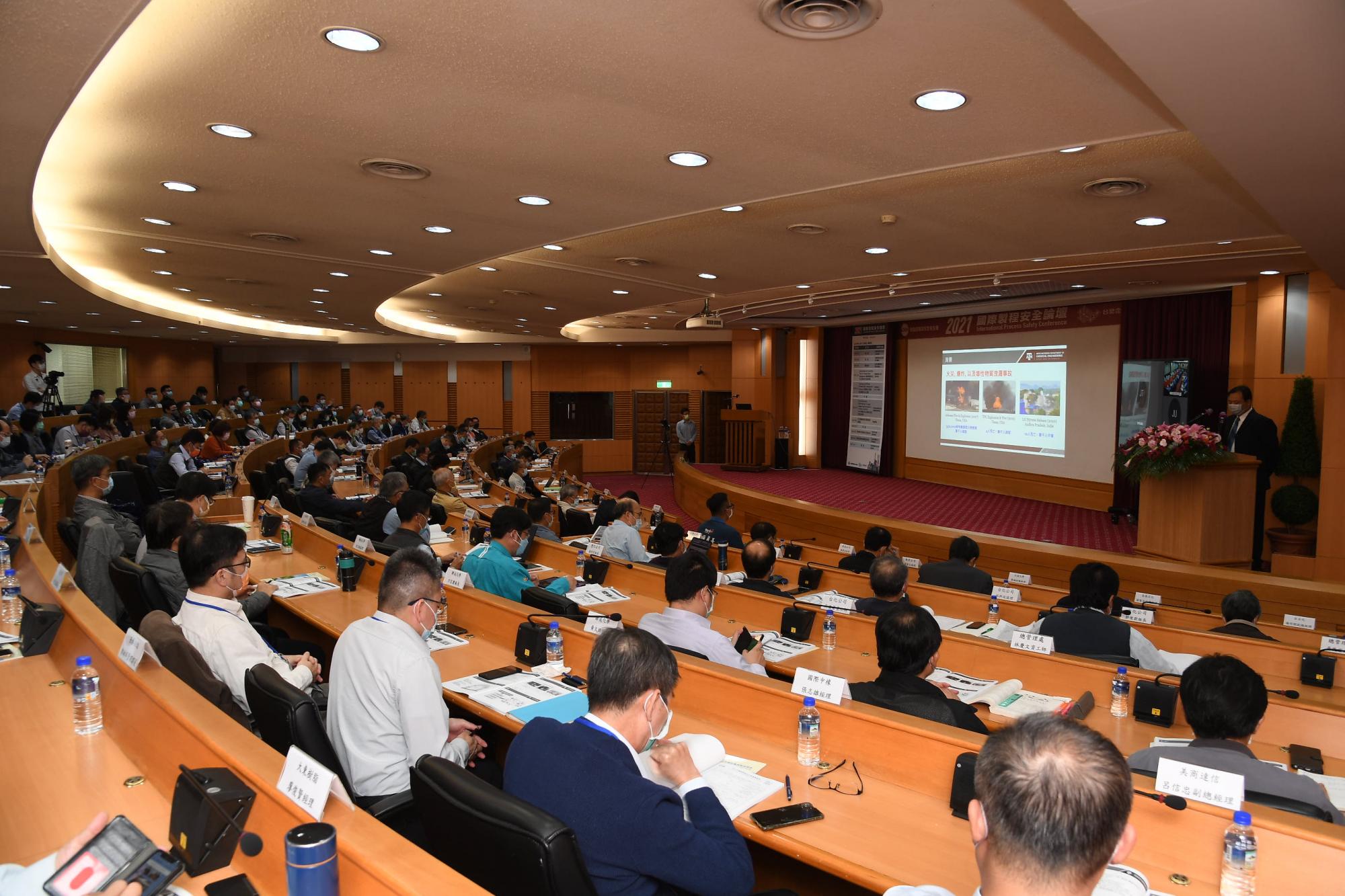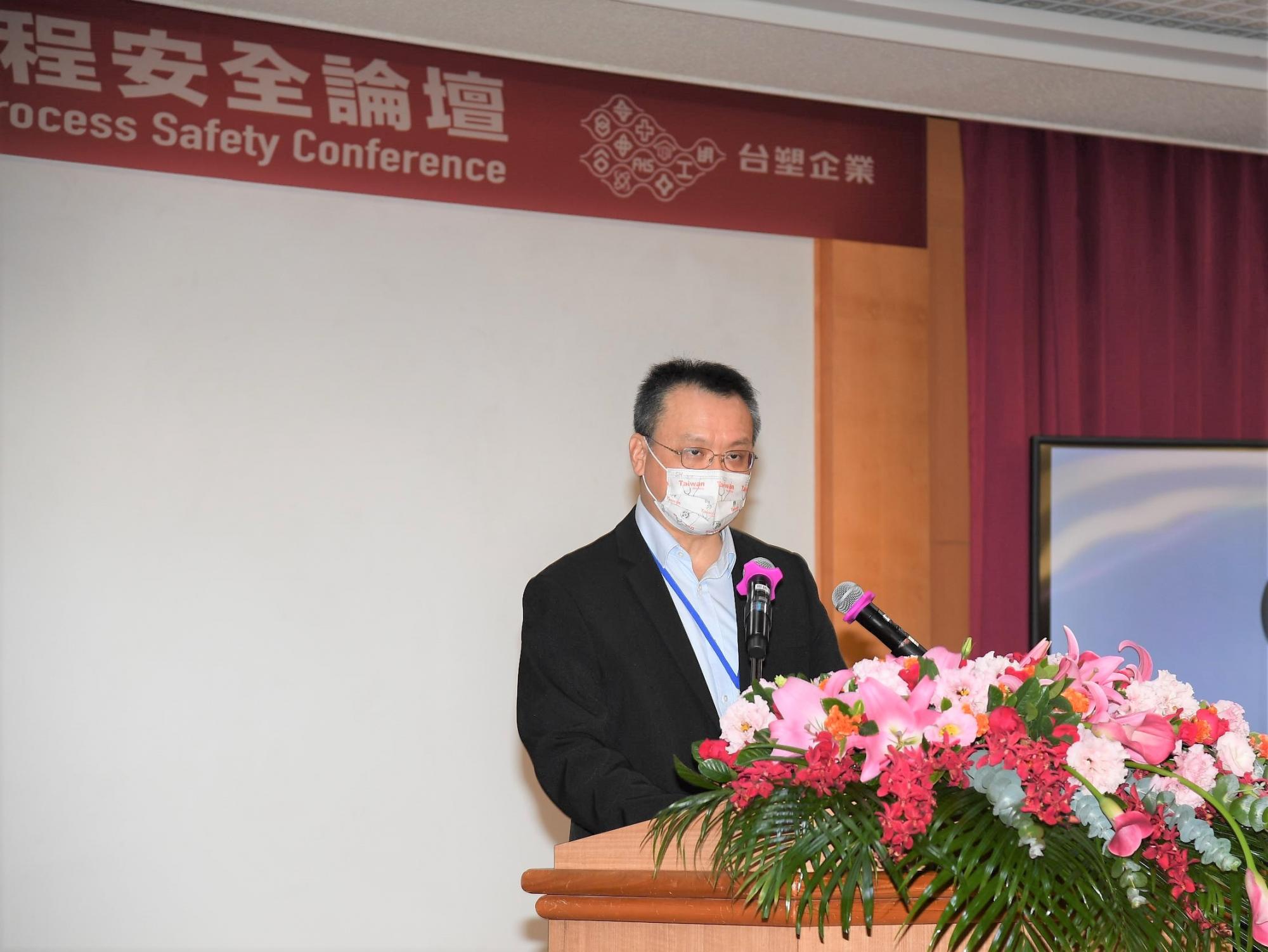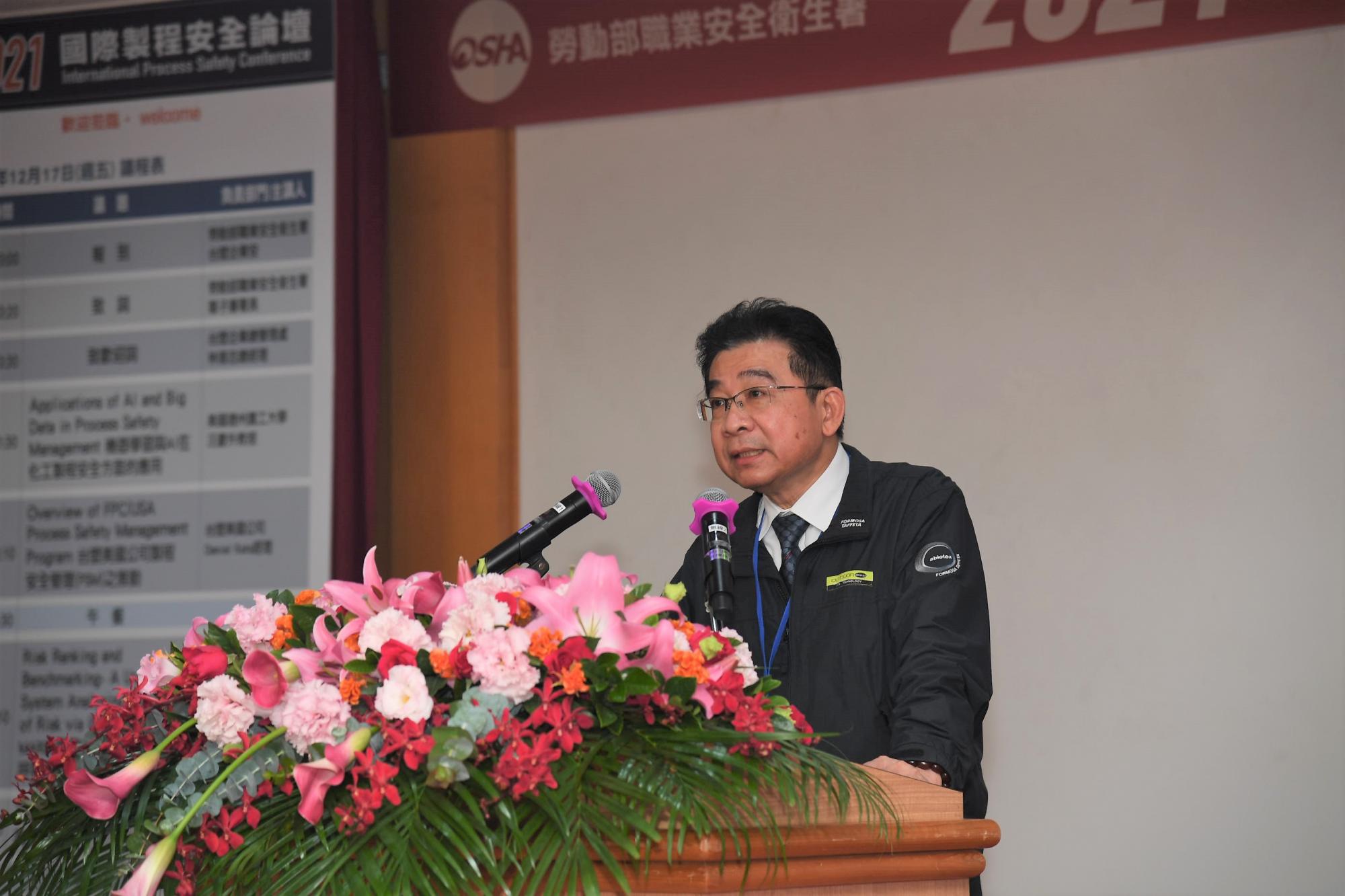The Occupational Safety and Health Administration, Ministry of Labor and FPG received good feedback for the International Process Safety Forum co-organized for the first time in August 2018, and once again co-organized the forum in FPG's Mailiao Park on December 17, 2021. The forum invited domestic and foreign process safety experts to publish the latest concepts and technologies, in hopes of elevating the process safety management standards of the domestic petrochemical industry through the exchanges, in order to meet society's expectations for FPG as the benchmark of Taiwan's petrochemical industry.
In the morning of December 17, a sea of banners with labor safety slogans directed participants from the entrance of Mailiao Industrial Complex to the administrative building, the venue of the forum. Workers moved around for the final inspection and testing to prepare for the forum. It was apparent that the forum that day was a major event. As was expected, in addition to the 180 supervisors from industry, government, academia, and FPG who personally participated in the forum, 2,522 people who could not attend the forum in person, including members of the Chinese National Federation of Industries, Petrochemical Industry Association of Taiwan, Taiwan Synthetic Resins Manufacturers Association, and Taiwan Responsible Care Association, viewed the live stream on FPG's Facebook fanpage and Youtube.


Chairman gives a welcome speech
Director-General Tzu-Lien Tzou of the Occupational Safety and Health Administration was the first to give a speech in his usual humor style, but had profound implications in labor safety. Key points of his speech are summarized below:
The petrochemical industry accounts for 28.8% of the manufacturing industry's output value in Taiwan, and plays a crucial role in Taiwan's economic development. However, most processes of the petrochemical industry involve high temperature and high pressure operations, as well as large amounts of flammable, explosive, or toxic chemical substances. If a fire accident or explosion occurs, it may cause casualties and asset loss, while drawing public attention or causing large scale protests.
Recent petrochemical accidents overseas, such as the acetic acid leakage of LyondellBasell in the United States and the explosion in Germany's Leverkusen Chemical Park, have drawn considerable attention from the public. The only way to achieve sustainable operation and enhance a company's international competitiveness is to implement process safety work and create a better safety culture. Director-General Tzou did not forget to thank FPG for elevating overall process safety management standards in Taiwan's petrochemical industry. He gave recognition to FPG for not only providing the venue and facilities for the forum, but also selflessly sharing its process safety management experience from the past few years.

President Sang-Chi Lin of the Administration Department of Formosa Plastics Group then welcomed the attendees and responded light-heartedly to Director-General Tzou. He thanked the competent authority, experts and scholars, and petrochemical companies for traveling so far to attend the International Process Safety Forum, and hoped to learn new knowledge of international process safety management, improve the concepts, technologies, and practical experience of domestic petrochemical companies, and keep up with international trends through the forum.
Regarding the function of process safety management, simply put, petrochemical plants use flammable, explosive, and even toxic chemical substances, and leakages of processes may cause severe accidents, such as fire accident, explosion, or toxic chemical leakage. Due to the low probability of the risk, it is hard to gain experience to identify causes of such accidents, but the severity of such accidents may endanger public safety, so it is necessary to use process safety management mechanisms to monitor, prevent, and control the risk. After introducing process safety management regulations of the US OSHA in 2011, FPG has maintained close interactions and exchanges with Texas A&M University. Starting in 2016, FPG has sent personnel to attend the annual conference of the Center for Chemical Process Safety (CCPS) under the American Institute of Chemical Engineers (AIChE), in order to stay up-to-date on international trends in process safety management and continue to improve FPG's standards. FPG co-organized the International Process Safety Forum with the Ministry of Labor Occupational Safety and Health Administration in 2018 and 2021 to fulfill its corporate social responsibility, and hopes that it will drive domestic exchanges of process safety concepts and technologies in Taiwan.

Director-General Tzou and President Sang-Chi Lin were interviewed by the press after their speech. A total of 20 reporters from 11 media (Liberty Times, China Times, Economic Daily News, Commercial Times, Central News Agency, The Epoch Times, The Commons Daily, United Daily News, Taiwan Times, and Taiwan News Daily) were at the event. The two hosts of the forum answered all of the questions asked by the reporters. Director-General Tzou stated that the Occupational Safety and Health Administration was optimistic about the forum, and also stressed that process accidents in petrochemical plants usually cause a chain reaction, so prevention, disaster loss control and disaster response are all related. Safety is an expertise but not a patent, and everyone shared what they know during the forum to jointly make improvements.
President Chi-Shan Lin also shared with reporters that after FPG implemented process safety management, Mailiao Park's labor safety has shown significant improvement. In the annual Safety Partner Implementation Results Contest organized by the Ministry of Labor Occupational Safety and Health Administration, 28 units of FPG stood out from the rest after the first and second rounds of the contest, and FPG went on to win first place. When a reporter asked about FPG's budget for labor safety, President Lin made it clear that FPG does not have a limit on what it is willing to spend on improving labor safety, and that improving safety and health management standards is also a way to fulfill its corporate social responsibility. With regard to improving pipeline leakages, FPG invested a significant amount of its funds to comprehensively rectify and replace its pipelines, and also utilized AI and big data to monitor the serviceability of its pipelines. This allows FPG to discover issues and making improvements at an early stage, and it has achieved good results in doing so.
There were 11 online news reports on the forum that day, and four newspapers (The Commons Daily, United Daily News, Taiwan Times, and Taiwan News Daily) reported on the forum and interviews using half a page the following day.
During the morning session of the forum, three experts in the United States gave speeches via video chat, and the afternoon session featured another four experts.
First, Professor Ching-Sheng Wang at the Process Safety Center of Texas A&M University shared a topic that has been trending worldwide in recent years "application of machine learning and AI in chemical engineering process safety." Professor Wang's speech mainly focused on process safety information, process hazard analysis, standard operating procedures, and accident investigation. Process safety information: A computer module is created based on machine learning to predict the physical and chemical characteristics of chemical compounds. The process accident of Eastman in the State of Tennessee is used as an example, and the Hierarchical Bayesian Model is used to analyze historical data of variables for process units and identify key factors that caused the accident. The technology can also be used examine routine process operations, and whether there are outliers in high dimensional space, which is used to find the cause of process deviations, so that improvements can be made or the cause can be prevented beforehand.
Daniel Kats and Jamie Tseng, managers at Formosa Plastics Corporation, USA, then shared key improvements made by the Texas Plant in response to abnormalities found in third party audits of process safety management. They also shared the example of casualties in two major labor safety accidents in Germany's Chempark and the chemical engineering park in Houston, Texas in 2021.
During the afternoon session, Vice President Yue-Feng Chen of Marsh first introduced petrochemical plant risk assessment ratings. Based on the experience of the insurance group's engineers with assessing petrochemical plants worldwide, insurance customers are able know the overall safety level of their plants relative to the region.
Next, Professor Ming-Hsiao Tsai, convener of the Process Safety Joint Auditing Task Force of the IDB, described the outlook of the petrochemical industry's process safety management. Professor Tsai said that FPG is the poster child for process safety management in Taiwan, but it can still continue to improve its process safety level from the well-known PSM14 to the international RBPS20.
Professor Hung-Chang Liao of National Kaohsiung University of Science and Technology shared a hazard analysis of negligence in process operating procedures. Professor Liao used statistics of accidents at petrochemical plants worldwide, processes operate under normal conditions 95% of the time and operate under abnormal conditions 5% of the time, but 70% of accidents occur when processes operate under abnormal conditions, showing that operations under abnormal conditions have relatively high risk and deserve more attention. Hence, different process hazard analysis methods must be used. Professor Liao used the procedures for opening and closing valves in a simple process to explain the hazard derived from incorrect operation, and explained how to identify risks and make improvements.
Finally, Section Chief Chun-Wei Kuo of Formosa Chemicals & Fibre Corporation introduced the smart monitoring system for pipeline equipment corrosion. Among all of the topics in the forum, this topic was discussed the most that day, and the director-general of the Occupational Safety and Health Administration, officials from the competent authority of labor inspection, scholars, and technical experts from CPC Corporation and TASCO Group looked into the principles, assumptions, and correction coefficient. They brought the precious experience back to their units to fully utilize the benefits of the forum.
Conclusion
The forum was a success, and Director-General Tzou highly approved of and expressed his gratitude during his concluding remarks that day. Looking back at FPG's implementation of process safety management over the past decade, FPG has upheld the spirit to strive for excellence, and all employees dedicated their efforts to EHS, maintenance, engineering, and production and marketing management to improve the process safety of each plant, producing concrete results. In the future, we will continue to adopted international practices in advanced process safety management to achieve better process safety for sustainable production and stable business performance.
.JPG)
(FPG, Jan 5, 2022)

